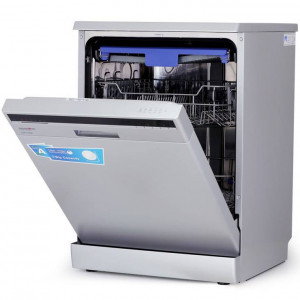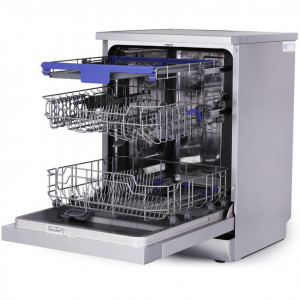| Pak Shooma |


| Registration Date | 29 Sep 2018 |
| Revision Date | 29 Sep 2018 |
| Share |
Home Appliance Housecleaning
Dishwashing machineNanometric conservation coatings lead to better corrosion resistance. Accordingly, samples were scratched base on ASTM D1654-16 standard at first and then their corrosion resistance were evaluated by ASTM B117 – 16 “Standard practice for operating salt spray”. Salt spray testing is an accelerated corrosion test that produces a corrosive attack to coated samples in order to evaluate (mostly comparatively) the suitability of the coating for use as a protective finish. Mostly, the salt water contains 5%wt salt and 95%wt distilled water. PH of the solution is 6.5-7.2, spraying pressure is 0.83- 1.24 bar and the temperature of the exposure zone of the salt spray chamber is approximately 35 0C. According to ASTM B117 – 16 standards, coatings with the grade of 10 have the pest condition and 0 with the worst condition.
A dishwasher is a mechanical device for cleaning dishware and cutlery. The free standing dishwasher is one of the most popular of their kinds. Unlike manual dishwashing, which relies largely on physical scrubbing to remove soiling, the mechanical dishwasher cleans by spraying hot water, typically between 45 and 75 °C (110 and 170 °F), at the dishes, with lower temperatures used for delicate items. A mix of water and dishwasher detergent is pumped to one or more rotating spray arms, which blast the dishes with the cleaning mixture. Once the wash is finished, the water is drained, more hot water enters the tub. Due to the permanent presence of detergents and water in the washing process, the body of the appliances should be resistant to corrosion. To this end special coatings have been used on the metallic body of these appliances. Conversion coatings are one of them which are produced with a chemical or electro-chemical process. Examples include chromate conversion coatings, phosphate and zirconium conversion coatings on steel, and anodizing. Among these kinds of coatings, zirconium based ones possess advantages. No need to temperature increase, activation and the use of distilled water in their coating processes, coating’s process time and cost reduction, absence of some elements such as nickel, chromium, phosphate and production of ultra-thin (nano meter) coatings and achieving to better corrosion resistance and better adhesion of colors to substrate are some of them. Coatings with nano thickness are used in this product which cause better corrosion and adhesion properties.